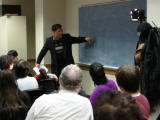
Film professor Zhenhai Tang will introduce and discuss mainland Chinese director Jia Zhangke’s Still Life (aka Sanxia Haoren), a last minute entry into the 2006 Venice Film Festival, that won the Golden Lion award thanks to its top-notch cinematography and wonderful storytelling. Still Life interweaves the story of a miner (Han Sanming) who travels thousands of miles to a town near the Yangtze River to look for his ex-wife and a nurse fetching her husband who has been working at the river without sending a single word home. While the film does not let these two characters cross paths, together they reflect changes in people’s lives brought by the Three Gorges Dam, which flooded villages near the Yangtze River and led to the emergence of some new settlements. Already acclaimed for his earlier works, most of which also star Han Sanming and Zhao Tao, Jia is probaby the best known Sixth Generation director. With Still Life, he continues his probing grassroots studies of Chinese life.


Jia’s previous acclaimed titles Platform (2000) and The World (2004) also competed at the Venice Film Festival. He has also set a record for Chinese directors by having two films selected for the Venice Film Festival, the other entry being his documentary Dong in the Horizons section.
Natural Hazards Revisited

